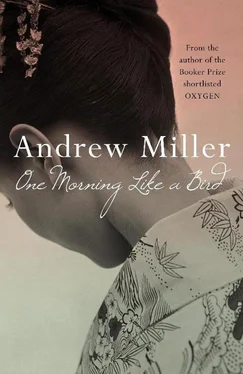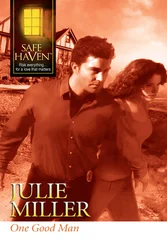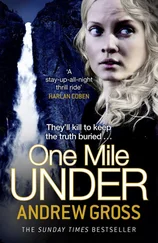Andrew Miller - One Morning Like a Bird
Здесь есть возможность читать онлайн «Andrew Miller - One Morning Like a Bird» весь текст электронной книги совершенно бесплатно (целиком полную версию без сокращений). В некоторых случаях можно слушать аудио, скачать через торрент в формате fb2 и присутствует краткое содержание. Год выпуска: 2009, Издательство: Sceptre, Жанр: Историческая проза, на английском языке. Описание произведения, (предисловие) а так же отзывы посетителей доступны на портале библиотеки ЛибКат.
- Название:One Morning Like a Bird
- Автор:
- Издательство:Sceptre
- Жанр:
- Год:2009
- ISBN:нет данных
- Рейтинг книги:4 / 5. Голосов: 1
-
Избранное:Добавить в избранное
- Отзывы:
-
Ваша оценка:
- 80
- 1
- 2
- 3
- 4
- 5
One Morning Like a Bird: краткое содержание, описание и аннотация
Предлагаем к чтению аннотацию, описание, краткое содержание или предисловие (зависит от того, что написал сам автор книги «One Morning Like a Bird»). Если вы не нашли необходимую информацию о книге — напишите в комментариях, мы постараемся отыскать её.
One Morning Like a Bird — читать онлайн бесплатно полную книгу (весь текст) целиком
Ниже представлен текст книги, разбитый по страницам. Система сохранения места последней прочитанной страницы, позволяет с удобством читать онлайн бесплатно книгу «One Morning Like a Bird», без необходимости каждый раз заново искать на чём Вы остановились. Поставьте закладку, и сможете в любой момент перейти на страницу, на которой закончили чтение.
Интервал:
Закладка:
The taxi comes at one.
‘We’ll say our goodbyes here,’ says Feneon. ‘No handkerchiefs waving from the quayside, please.’
The girls form a line. He embraces each in turn, embraces Miss Ogilvy, wipes the small tear from her cheek. He takes the baby in his arms, kisses him until he writhes in protest, then holds his daughter, strokes her hair, gently untangles himself. To Yuji he says, ‘Did I ever apologise for hitting you?’ He reaches into a pocket of his overcoat. ‘This came to light while I was packing. I have no use for it now and perhaps it will make up for any unpleasantness between us.’
He kisses his daughter again, kisses his grandson, picks up Beatrice who, half demented with jealousy of the baby, will travel with him, and goes to the door. Through the window Yuji sees him getting into the car. The driver shuts the door. Feneon looks back at the house, smiles and turns away.
The girls immediately surround Alissa. They seem primed for dramas of this kind, of any kind. They are not reserved, not coolly secretive like the women in the paintings. Whatever they feel is played out on their faces without hesitation. Yuji moves away from them and looks at the envelope in his hand. There is a stamp with a lion on it, and an address written in ink faded to the colour of dried blood: ‘19 rue saint-Maur, Sézanne, France.’ The paper is mottled, stained by time, by the immense journeys it has made. It is beautiful. He smiles at it. He almost prefers not to read it at all but to go on imagining it, the precious content, as if he was one of the old poets picturing the moon from behind drawn blinds. Then the thought seems idiotic, unworthy of such a gift, and he tugs the letter through the ragged lips of the envelope and tilts it towards the afternoon light.
For two minutes the handwriting is completely impenetrable. He begins to panic. To have it in his hands and not be able to read it! Unbearable! He starts again, scans each crabbed line as calmly, as methodically as he can. Single words appear — silence . . newspapers . . money . . dogs . . God . . Then clusters of words — I never find . . half of Europe . . into his fields . . backs of carts . . Then at last, he has it. It speaks.
Harar, 4 February 1890
My dear Feneon,
Excuse my long silence. I never find anything interesting to say! Deserts full of stupid niggers, no roads, no mail, no travellers.
I haven’t seen a French newspaper in weeks. For all I know half of Europe is dead with the pox. Well, so much the better — though naturally I hope a good Christian family like yours is spared!
My last caravan was a disaster. Did you hear of it? A year of incredible hardships and damn all to show except more creditors. Monsieur Ilg reproaches me for not giving the drivers sufficient provisions. He says he had to put the donkeys into his fields because they were covered in sores and too weak to continue. But is that really my fault? You know how things are here. Why should I be blamed?
As a result of all I have endured, the endless walking and riding in this damned country, I have varicose veins in my right leg that keep me awake all night. I’ve ordered some special stockings from Aden but I doubt they’ll have them. I shall probably have to write to Mother and see if she can buy some in Vouziers. The silk ones are meant to be best, though the important thing is that there should be enough elastic in them. They also need to be long enough to give support to the whole leg and not just the knee, and they should be adjustable with some sort of lacing. In the meantime I shall have to struggle on as best I can, though the truth is I feel more like a dog tethered to the back of a cart than a human being. One day I’ll stumble and some thoughtful bastard will cut me loose and leave me for the vultures. A charming prospect, don’t you think?
Yours, with a feeble handshake,
A. Rimbaud
12
Miss Ogilvy offers Alissa her old pink bedroom at the academy. She will be safe there, and comfortable, until her father can send for her, but Alissa, with a smile, a shake of her head, leaves with Yuji and Emile for the early evening train to Tokyo. It’s the slow train, the local. At each stop the carriage becomes more crowded. Alissa keeps her eyes lowered, holds the sleeping baby tightly in her arms. Yuji stands over them, gripping the ceiling strap. He is aware of people, women particularly, trying to get a clear view of the baby’s face. One man, heavily drunk, looks as if he might pass a remark, but his courage fails him or he is too drunk to speak. He sits on the carriage floor, lets out a sigh as if of death, and falls asleep.
By the time the taxi drops them off in Kanda it has started to snow again. Alissa gives Yuji the house key. In the salon, he quickly cleans the ashes from the stove and builds a fire. When it catches, he swings shut the iron door, adjusts the vents, and feels a surge of primal satisfaction, the pleasure of bringing warmth where it is needed, of bringing it to those who have been entrusted to him.
‘You really think he’ll be all right?’ asks Alissa, a question she has already put to Yuji four or five times since Feneon’s departure. His words, for now, have the power to calm her, and this too gives him pleasure. ‘He will,’ he says, emphatically. She nods and busies herself with the baby.
They have brought a parcel of food with them from the academy, remains of the lunch no one had much appetite for. In the kitchen there are a last few bottles of wine. They open one, touch glasses. ‘He was born out of a bottle of wine,’ she says, blushing and looking down at the sleeping head by her thigh. They pick at the food, grow drowsy. A glance past the shutters into the garden shows the snow still falling heavily.
‘You won’t get home tonight,’ she says. Yuji agrees. ‘You could use Papa’s room,’ she adds, quickly. ‘It’s nicer than the spare room. There are blankets and sheets in the cupboard beside the kitchen.’
He tries to call Miyo but it seems the lines have been affected by the weather. All he can hear in the receiver is something like the whispering, the urgent whispering of phantom voices.
At ten Alissa goes upstairs with Emile. Yuji makes the bed in Feneon’s room, puts out the light. The snow rubs its blunt fingers against the window. The city of millions is silent . . Then the baby starts to wail, that sound Yuji is becoming so familiar with, that he seems to hear half a second before it begins. He sits up, willing it to stop, but it grows louder, an utterly intemperate sound, inhuman, like a giant cicada. Should he go in? Can he help? Would she welcome his help? He swings his legs to the edge of the bed but as his toes touch the floor the crying ceases, mid-phrase, leaving behind it a deep and brittle hush. He waits, then slowly lies his head on the bolster again, pulls up the blanket. He is tired but he knows that something in him will go on listening. Something in him will never stop listening now.
In the morning he tramps through the snow to the bakery, the one the Russian priests used to go to. There’s a queue. There’s always a queue now where food is sold. On his way back to the house, he is stopped by Ooka the bookseller. ‘If the Frenchman left any nice books behind, why don’t you bring them over to the stall? Nothing improper, of course, nothing unpatriotic, but there’s still a market with the students for foreign stuff.’
Alissa eats half a loaf of dark bread, smothering the slices in jam. She drinks warm milk flavoured with cinnamon, and into the last glass breaks an egg, laughing at her own appetite. When she has finished, she passes Emile to Yuji and stretches out on the sofa. In less than a minute she’s asleep. Yuji puts more wood on the stove, then sits on the rug opposite the sofa, the baby across his knees. Alissa is in her nightclothes still. The unbuttoned gown hangs open over the skin of one of her breasts. He stares at the edge, the seashell-pink rim of visible nipple, then looks away, frowns at the patterns in the rug and attempts to correct his thinking. Her breasts are for feeding the child. Their fullness is from the milk they carry. She is a mother (that object of universal veneration), a nursing mother, and yet the atmosphere around her, around her and the child, around all three of them, is drowsy and voluptuous and not at all what he might have imagined. He seems to be in a continuous state of mild arousal. Do all new fathers feel like this, everything sunk into the body? And what about the women? Was the ‘ghost’ an animal once, heavy as the one now sleeping with lips slightly parted on the sofa?
Читать дальшеИнтервал:
Закладка:
Похожие книги на «One Morning Like a Bird»
Представляем Вашему вниманию похожие книги на «One Morning Like a Bird» списком для выбора. Мы отобрали схожую по названию и смыслу литературу в надежде предоставить читателям больше вариантов отыскать новые, интересные, ещё непрочитанные произведения.
Обсуждение, отзывы о книге «One Morning Like a Bird» и просто собственные мнения читателей. Оставьте ваши комментарии, напишите, что Вы думаете о произведении, его смысле или главных героях. Укажите что конкретно понравилось, а что нет, и почему Вы так считаете.












